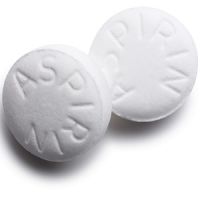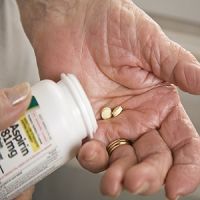Results of the Aspirin in Reducing Events in the Elderly (ASPREE) trial indicate that aspirin use in healthy elderly persons (70 years or older) did not prolong disability-free survival over a period of five years but led to a higher rate of major haemorrhage than placebo. The findings are published online in The New England Journal of Medicine.
Aspirin has become one of the most popular agents used for the primary prevention of cardiovascular disease, largely on the basis of results from studies of secondary prevention of myocardial infarction and ischaemic stroke. But large trials investigating primary cardiovascular prevention, mainly involving participants younger than those in the ASPREE trial, have not shown a consistent effect of aspirin on cardiovascular outcomes.
Despite the widespread use of low-dose aspirin in elderly persons who do not have a medical indication for aspirin, there is limited evidence that the beneficial effects outweigh the risks in this age group. ASPREE, a randomised, double-blind, placebo-controlled trial aimed to investigate whether the daily use of low-dose aspirin in healthy seniors would prolong healthy life span. The primary end point was a composite of death, dementia, or persistent physical disability.
A total of 19,114 persons with a median age of 74 years were enrolled, of whom 9,525 were randomly assigned to receive aspirin and 9,589 to receive placebo. A total of 56.4% of the participants were women, 8.7% were nonwhite, and 11.0% reported previous regular aspirin use. The trial was terminated at a median of 4.7 years of follow-up after a determination was made that there would be no benefit with continued aspirin use with regard to the primary end point.
The study's key findings include:
- The rate of the composite of death, dementia, or persistent physical disability was 21.5 events per 1,000 person-years in the aspirin group and 21.2 per 1,000 person-years in the placebo group (hazard ratio, 1.01; 95% confidence interval [CI], 0.92 to 1.11; P=0.79).
- Differences between the two groups were not substantial with regard to the secondary individual end points of death from any cause (12.7 events per 1,000 person-years in the aspirin group and 11.1 events per 1,000 person-years in the placebo group), dementia, or persistent physical disability.
- The rate of major haemorrhage was higher in the aspirin group than in the placebo group (3.8% vs. 2.8%; hazard ratio, 1.38; 95% CI, 1.18 to 1.62; P<0.001).
"No significant difference was identified regarding the effect of aspirin between the participants in the United States and those in Australia or across a range of other subgroups (prespecified or not prespecified)," the authors note. "White participants comprised 91% of the overall trial cohort. Owing to the small number of blacks and Hispanics (including participants who were younger than 70 years of age) and other nonwhites, the applicability of the main findings of the ASPREE trial to these subgroups is unclear."
The limitations of the ASPREE trial include the relatively short duration of the intervention, which may be important for detecting an effect of aspirin on conditions such as Alzheimer’s disease and cancer, which have long latencies between their biologic substrates and clinical presentation, the authors explain. The trial results also do not rule out a favourable effect of aspirin if its administration had been commenced at an earlier age or continued for a longer period of time. This trial did not directly address the question of whether healthy older persons who have been using aspirin for primary prevention should continue or discontinue its use.
Image Credit: Pixabay
References:
McNeil JJ, Woods RL, Murray AM et al. for the ASPREE Investigator Group (2018) Effect of Aspirin on Cardiovascular Events and Bleeding in the Healthy Elderly. N Engl J Med. Published online 16 September 2018. DOI: 10.1056NEJMoa1800722
Latest Articles
aspirin, ASPREE, elderly persons
Results of the Aspirin in Reducing Events in the Elderly (ASPREE) trial indicate that aspirin use in healthy elderly persons (70 years or older) did not prolong disability-free survival over a period of five years but led to a higher rate of major haemorr



























